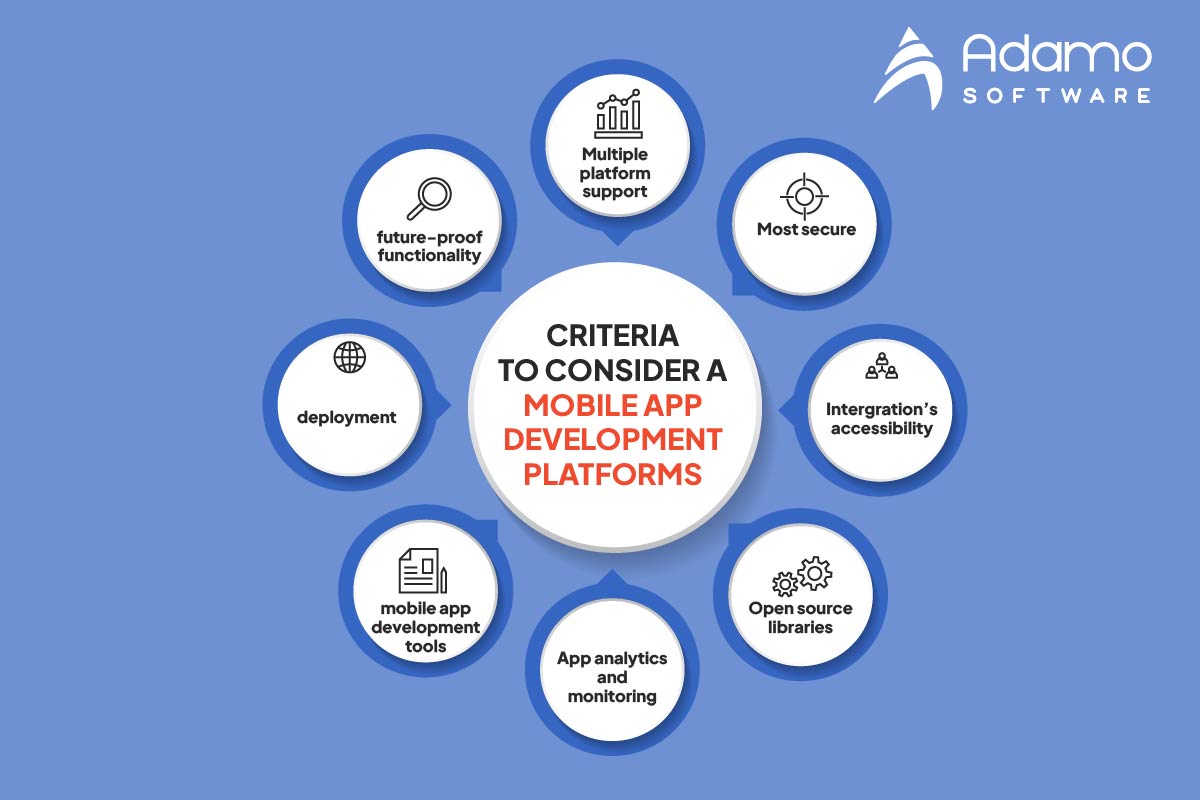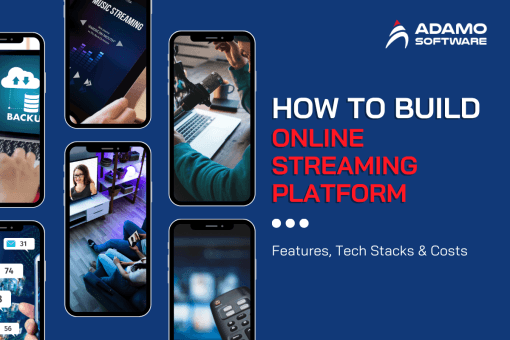Top mobile app development platforms to consider in 2023

With the right mobile app development platform, you can transform your app idea into a reality and tap into the vast potential of the mobile market.
By 2023, the market for mobile app development platforms is anticipated to generate USD 70.59 billion. Unavoidably, the demand for mobile app development platforms will continue to rise as they enable developers and entrepreneurs to construct an app’s various elements and features.
Nevertheless, we recognize that choosing the best mobile app development platform will not be simple for you. To simplify the process, we have listed out the best mobile app developments and outlined the most important selection criteria for selecting one of the top platforms.
I. What is a Mobile App Development Platform?
A mobile app development platform is a collection of technologies, tools, and services. It permits anyone to assemble diverse features and components. Additionally, it permits the design, development, testing, deployment, and maintenance of mobile apps across multiple platforms, devices, and networks.
Everyone would concur that developing mobile apps is not a simple task. You must consider various factors, including compatibility with all devices and mobile platforms.
It is difficult to create multiple standalone apps that are compatible with all platforms and devices. However, when using a mobile app development platform, you will only need to maintain a single codebase to ensure compatibility across platforms, devices, and networks.
Therefore, it will facilitate the development of mobile apps at a low cost.
II. Best Mobile App Development Platforms
1. Flutter
Google’s Flutter is an open-source mobile app development platform. It enables developers to create apps for Android, iOS, and the web using a single codebase and provides a variety of features and tools for creating visually appealing and responsive applications. Hot Reload is one of the best features of Flutter, as it enables developers to make changes to their code and view the results in real time, sparing them time and effort.
Flutter also offers various tools and services for developing an app’s backend, such as integration with cloud-based services and tools for user authentication, data storage, and push notifications. However, one limitation of Flutter is that it may not be as suitable as other platforms for developing apps with complex graphics and animations.
2. Cordova
Cordova is a well-known open-source mobile app development platform that enables developers to build cross-platform applications using HTML, CSS, and JavaScript. It provides a set of modules and APIs for accessing the camera, GPS, and storage, among other native device features and functionality.
Cordova offers integration with various tools and services for developing and deploying applications, including continuous integration and delivery. The app may not be as well-optimized for each operating system, which is a drawback of Cordova.
3. Sencha
Sencha is a mobile app development platform that provides a collection of tools and services for creating HTML5 and JavaScript-based cross-platform applications. It supports various UI components and layouts and provides various features for creating visually appealing and responsive applications.
4. Unity
Unity is a well-known mobile app development platform for developing cross-platform mobile apps, games, and interactive content. It provides a set of tools and services for creating, testing, and deploying apps, as well as integration with various services and tools for constructing an app’s infrastructure.
Support for various operating systems, including iOS, Android, and Windows, is one of Unity’s finest qualities. However, one of Unity’s limitations is that it is a performance-intensive platform, so apps or games developed with Unity may not perform optimally on legacy or older devices.
5. Ionic
Ionic is an open-source mobile app development platform that enables developers to create cross-platform applications with HTML, CSS, and JavaScript. It provides a set of tools and services for developing visually appealing and responsive apps, as well as integration with a variety of cloud-based services and tools for developing an app’s infrastructure.
Ionic’s USP is its simplicity and accessibility, as it utilizes web technologies that are already acquainted with many developers. It may not, however, provide the same performance and native experience as a native mobile app development platform. Also, troubleshooting your code with Ionic can be difficult due to ambiguous error messages.
6. React Native
Meta developed the ubiquitous mobile app development platform React Native. It enables developers to create native applications for iOS and Android using JavaScript and the React library and provides a variety of tools and services for developing, testing, and deploying apps.
As the app is constructed using native components and APIs, one of the finest aspects of React Native is its ability to create a fluid and seamless user experience. React Native also provides various tools and services for building an app’s infrastructure.
7. NativeScript
NativeScript is a prominent open-source framework utilized for the creation of mobile applications on both the Android and iOS platforms. NativeScript enables the creation of native Android and iOS applications from a single codebase. NativeScript allows developers to create mobile applications using Typescript, Angular, or JavaScript.
8. Alpha Anywhere
It is a complete front-end and back-end mobile app development platform with low code. It is extensively used for the rapid development, distribution, and deployment of iOS and Android mobile apps.
Unique coding-optional technology enables developers to achieve high levels of productivity with complete independence.
Features:
_ Simple integration with all SQL and NoSQL databases.
_ Conflict resolution flexibility and large data storage capacity.
_ Enterprise-grade data security and total administrative command.
_ Integrated analytics and charting functions.
_ Simply add a drag-and-drop editor and scheduling to cross-platform apps with ease.
9. Xamarin
Xamarin provides add-ins for Microsoft Visual Studio that enable developers to create Android, iOS, and Windows apps using a C# codebase. Xamarin is preferred because it permits code collaboration across multiple platforms, such as cross-platform mobile app development.
Xamarin is well-known for providing a development ecosystem with backend, API, and components. Here are the best Xamarin-developed apps:
_ The World Bank
_ Alaska Airlines
_ American Cancer Society
Additionally, numerous tools, libraries, and programming languages support it. In addition, it has a cloud service that enables testing on any number of devices.
10. Mendix
Medix is the quickest and simplest mobile app development platform for developing low-code apps. Therefore, it is extensively used by businesses to develop high-performance mobile and web apps.
It accelerates the development, deployment, and operations of enterprise apps. Mendix facilitates the implementation of both Agile and DevOps.
In addition, it provides no-code and low-code tools on a single, fully integrated mobile app development platform.
III. Advantages of mobile app development platforms
1. Easy to use
Mobile app development platforms frequently include a user-friendly interface and a selection of pre-made elements and functionality that can streamline the development process. It helps businesses to develop a new mobile app development solution.
2. Cross-platform compatibility
Mobile app development platforms enable developers to develop mobile apps that can operate on various operating systems through a use of a single codebase.
3. Strongly integrated with cloud-based services
Lots of mobile app development platforms can integrate with cloud-based services and tools. It helps simplify software development processes and reduce the demand for software engineers to develop and maintain the servers and software infrastructure.
4. Testing and debugging tools
You might know that mobile app development platforms assist as a tool and a service to test and debug mobile applications, such as simulators and emulators. Besides, they can be tools to track and fix problems, which helps ensure that the mobile apps can be created in a high-quality and performed on different mobile devices as well as operating systems.
If you want to hire a partner to help you develop a custom mobile app, read our dedicated blog about Top 10 legit mobile app maker companies in 2023
IV. Criteria to Consider a Mobile App Development Platform
Here are the most important features and criteria for selecting a platform that facilitates your work.

1. Multiple platform support.
Whenever you intend to develop enterprise or consumer apps with the mobile app development platform, you must ensure that this feature is available.
In a time when the mobile ecosystem is evolving with multiple platforms, devices, and other factors, it is necessary to choose a mobile app development platform that supports multiple platforms.
Investing in a cross-platform mobile app development platform that facilitates the integration and modification of various features across all devices and OS platforms. For example, Web, Android, and iOS would be your choice.
2. Most Secure.
We anticipate that our mobile applications will function without significant hiccups.
However, the mobile app frequently contains sensitive data, such as payment information and a contact list.
The loss of a mobile device can terrify anyone. Therefore, an additional layer of security will be required. A MADP must provide secure data and information management for users.
In such situations, you must safeguard data using a dependable mobile app development platform.
3. Integration’s accessibility.
In the subsequent phase of app development, many clients frequently incorporate new and enhanced features.
Consequently, if you anticipate adding new features to your app, you should select a mobile app development platform that can meet your needs and facilitate the addition of those features.
4. Access to Open Source Libraries.
The app developer community is highly reliant on open-source libraries and APIs. Moreover, it is undeniable that they plan a crucial role in enhancing the speed, integration, and deliverance of the app development procedure.
Choose a mobile app development platform that provides complete access to and integration with these libraries, as well as complete freedom in using them.
5. App analytics and monitoring.
The majority of enterprise apps aim to provide a comprehensive user experience and opt for agile development methods. In most instances, user feedback leads to optimal app usage.
This enables app developers to quickly accommodate necessary changes. And in which MADPs serve a crucial role.
It facilitates the transformation of user data into visual insights. Consequently, a superior MADP simplifies the monitoring of app performance and analytics.
6. Mobile App Development Tools.
Mobile app development tools provide a collaboration platform for developing, testing, debugging, deploying, hosting, and maintaining mobile apps more easily.
Choose Android Studio, an app development tool, if you wish to create an app for the Play Store. Alternatively, you may choose Xcode for the App Store.
Many hosts favor low-code app development with pre-designed templates and drag-and-drop app-editors for their projects.
Many developers prefer a command line interface (CLI) due to its promising nature, which provides high flexibility for setting up and administering the development environment.
Choose a mobile app development platform that is convenient for the developer, as CLI restrictions can be aggravating and time-consuming.
7. Deployment.
You can deploy a mobile app development platform on-premises and as a cloud service. Using cloud services, it is simple to get started without incurring significant initial costs.
However, in the long term, an on-premise subscription will provide higher levels of security at a lower cost.
Ensure you make the correct decision and invest in a mobile app development platform that can meet the needs of your developers.
8. Future-proof functionality.
There is no doubt that technological advancement has occurred over time. Everyone anticipates more from each new iteration.
After creating a minimally viable product (MVP), if you intend to integrate additional features into an app, you must prioritize this feature.
Consequently, you must choose a mobile app development platform that can adapt to the altering technological requirements over time.
You can also explore How Long Does It Take To Make an App here
V. Adamo Software – The Leading Mobile App Development Company in Vietnam
As one of the leading mobile app development companies in Vietnam, Adamo Software is offering mobile app development services in many industries from travel and hospitality, food and beverage, fintech to social media and entertainment to other industries. With our expert in many fields, Adamo is here to help you transform your business ideas into lucrative and innovative software solutions.











